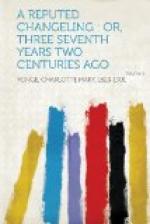“What was that?” hastily asked Lady Archfield.
“The old story, my lady. The young officer’s swaggering attempt to kiss the girl he meets on the road. I doubt even if he knew at the moment that it was my niece. Peregrine was coming by at the moment, and interfered to protect her, and swords were drawn. I could not deny it, nor that there was ill blood between the lads; and then young Brocas, who was later on Portsdown than we were, remembered high words, and had thought to himself that there would be a challenge. And next old Goody Spore recollects seeing Master Sedley and another soldier officer out on the Portsmouth road early that morning. The hay was making in the court then, and Jenny Light remembered that when the haymakers came she raked up something that looked like a bloody spot, and showed it to one of the others, but they told her that most likely a rabbit or a hare had been killed there, and she had best take no heed. Probably there was dread of getting into trouble about a smugglers’ fray. Well, every one was looking askance at Master Sedley by this time, and the coroner asked him if he had anything to say. He spoke out boldly enough. He owned to the dispute with Peregrine Oakshott, and to having parted with him that night on terms which would only admit of a challenge. He wrote a cartel that night, and sent it by his friend Lieutenant Ainslie, but doubting whether Major Oakshott might not prevent its delivery, he charged him to try to find Peregrine outside the house, and arrange with him a meeting on the hill, where you know the duellists of the garrison are wont to transact such encounters. Sedley himself walked out part of the way with his friend, but neither of them saw Peregrine, nor heard anything of him. So he avers, but when asked for his witness to corroborate the story, he says that Ainslie, I fear the only person who could have proved an alibi—if so it were—was killed at Landen; but, he added, certainly with too much of his rough way, it was a mere absurdity to charge it upon him. What should a gentleman have to do with private murders and robberies? Nor did he believe the bones to be Perry Oakshott’s at all. It was all a bit of Whiggish spite! He worked himself into a passion, which only added to the impression against him; and I own I cannot wonder that the verdict has sent him to Winchester to take his trial. Why, Anne, child, how now?”
“’Tis a terrible story. Take my essences, child,” said Lady Archfield, tottering across, and Anne, just saving herself from fainting by a long gasp at them, let herself be led from the room. The maids buzzed about her, and for some time she was sensible of nothing but a longing to get rid of them, and to be left alone to face the grievous state of things which she did not yet understand. At last, with kind good-nights from Lady Archfield, such as she could hardly return, she was left by herself in the darkness to recover from the stunned helpless feeling of the first moment.




